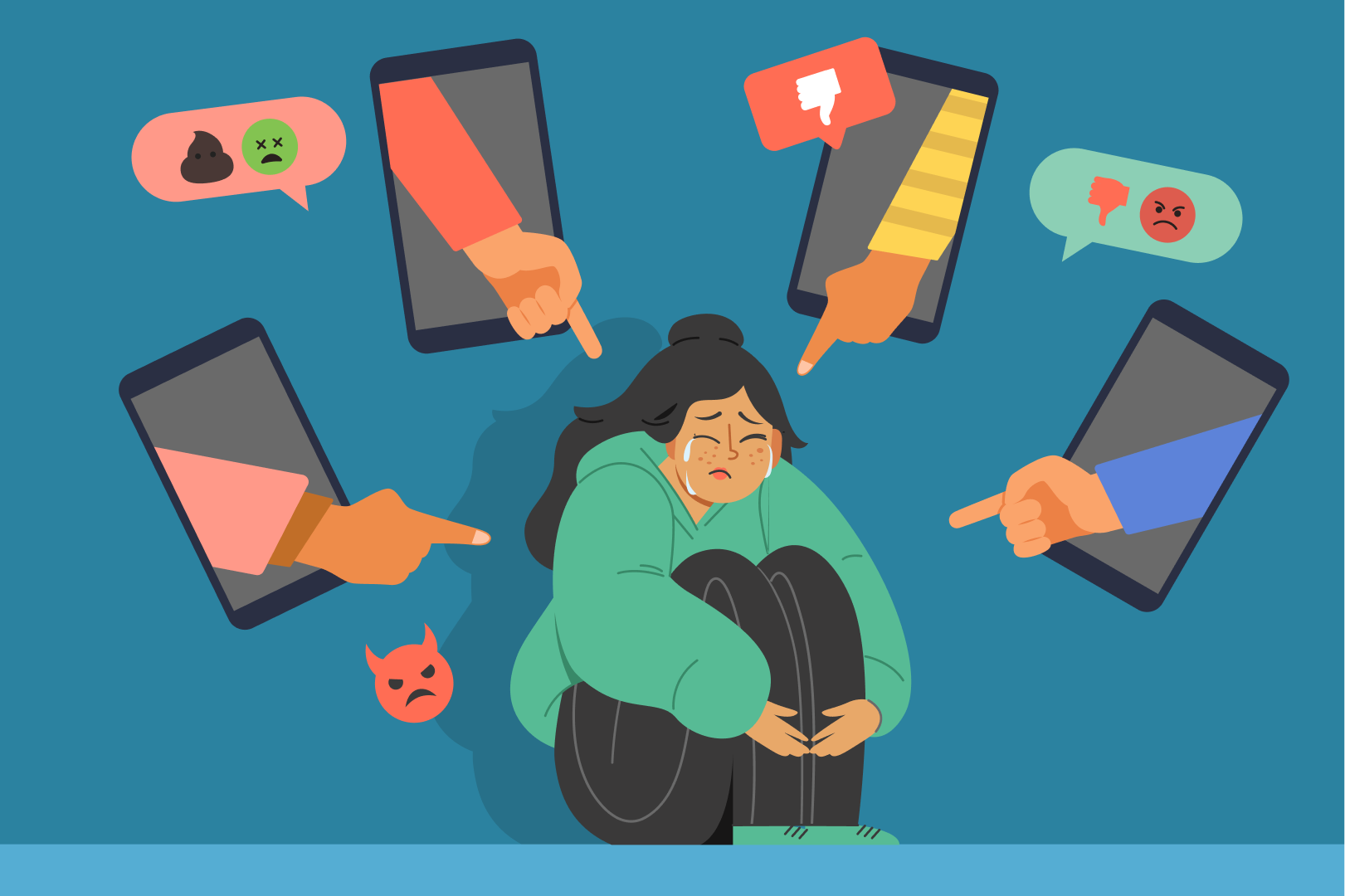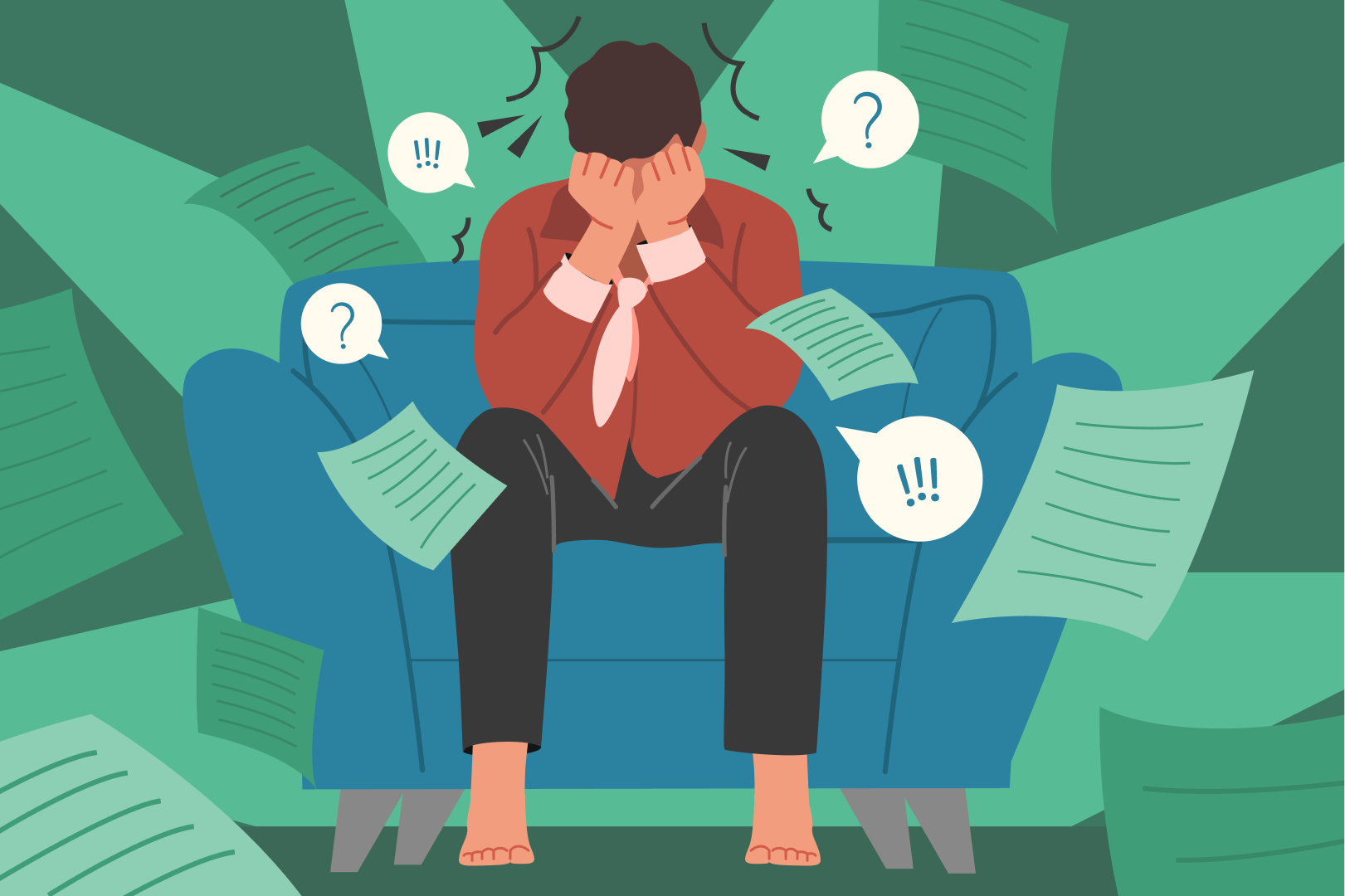Everyone feels anxious at times; it’s our body’s way of keeping us alert. But it becomes an issue when worry or fear starts to interfere with your day-to-day life. The signs of anxiety are being scared or nervous often, worrying that something bad will happen, finding it difficult to concentrate and avoiding doing things because of your anxiety.
What is anxiety?
Anxiety is your body’s physical response to threats. Your breathing might increase, your heart might start beating loudly, you could feel uneasy in your stomach, your palms may sweat and you may even get a sudden burst of energy.
Everyone feels anxious at times, and a certain level of anxiety is normal, and even helpful, in some situations. Anxiety is your body’s way of keeping you safe. For instance, imagine you’re walking home, and you’re dragging your feet because you’re tired. Out of the corner of your eye, you think you see a snake. Suddenly, you forget how tired you are and have a burst of energy that helps you to get out of harm’s way.
Anxiety can also motivate you. If you feel a bit anxious about an assignment that’s due or a job interview, anxiety can help you to power through.
However, feeling too much anxiety about something, or feeling anxiety that’s not connected to an obvious challenge, isn’t helpful. It can get in the way of your day-to-day activities and affect your quality of life.
What is an anxiety disorder?
An anxiety disorder occurs when anxiety starts to impact on a person’s life and prevents them from engaging with friends, family, work or school. Rather than feeling anxious in response to actual danger, someone with an anxiety disorder will experience the same symptoms in situations they perceive as dangerous (e.g. when meeting new people or taking public transportation).
Not all anxiety fits into a single category, and some people may experience a combination of different types. Some common types of anxiety include:
- Generalised anxiety disorder: excessive worry about anything and everything, including worrying about worrying.
- Social anxiety disorder: anxiety in social situations, often rooted in the fear of doing something wrong and being judged by others.
- Panic disorder: where the symptoms of anxiety overwhelm you and create a panic and you worry about future panic attacks.
- Agoraphobia: anxiety about having a panic attack in certain situations and not being able to escape or to get help.
- Obsessive compulsive disorder: anxious thoughts leading to obsessive behaviour and compulsions to do certain things.
- Specific phobias: intense fear of objects or situations (e.g. dogs or heights).
The signs and symptoms of anxiety
People who experience anxiety or an anxiety disorder may display a variety of different signs and symptoms. Different types of anxiety disorders can also have different symptoms. However, there are some common ones, including:
- racing heart or tightening of the chest
- rapid breathing
- feeling tense, restless, ‘on edge’ or wound up
- hot and cold flushes
- sweating
- shaking
- feeling weak or tired
- obsessive thinking excessive fear and worrying
- having a sense of impending panic, doom or danger
- imagining the worst-case scenario
- having difficulty thinking about anything other than what’s worrying you
- having trouble sleeping
- stomach or digestion issues
- avoiding situations that make you feel anxious (e.g. taking public transport, going to class or meeting new people).
Keep in mind that some people may not fit these exact symptoms, and this list isn’t designed to give you a diagnosis. You can use these as a guide, but only a doctor can give you a proper diagnosis.
Anxiety disorders aren’t caused by a single factor, but rather by a combination of things, which may include some of the following.
Family history
There is some evidence that people with anxious parents may be more susceptible to anxiety. This is due partly to genetic factors and partly to social learning.
Personality and learnt traits
People with certain traits can be more likely to have anxiety. For example, being a perfectionist or shy, or having low self-esteem, can contribute to developing anxiety. This doesn’t mean, though, that if you have those traits, you’ll definitely experience symptoms of anxiety.
Physical health
Some chronic physical conditions – such as asthma, food allergies, epilepsy, diabetes or heart conditions – may contribute to anxiety symptoms or affect treatment of anxiety. Having anxiety could also affect treatment for those physical health conditions.
Some physical conditions can mimic anxiety symptoms, so it can be useful to see a doctor to determine whether there is an underlying medical cause for your anxiety.
Stressful events or trauma
Ongoing stressful events or a traumatic experience can lead to a person developing anxiety. Some common triggers include:
- change in living arrangements
- financial stress
- stress about work or changing jobs
- family and relationship problems
- pregnancy and giving birth
- emotional strain and stress following a traumatic event
- physical, verbal, sexual or emotional abuse or trauma
- the loss or death of a loved one.
Other mental health conditions
Some people experience an anxiety disorder on its own, but it’s also common for an anxiety condition to occur together with other mental health conditions. Depression and anxiety often occur together. It’s important to get treatment for everything that’s going on.
What to do if you think you’re experiencing an anxiety disorder?
If you think you’re experiencing an anxiety disorder, visit your doctor or mental health professional. There are treatments available and your doctors can work with you to figure out a plan that suits you.
Get some information on treatments for anxiety here, and check out our self-care strategies for more info on what you can do to manage your symptoms, if you aren’t ready to see a doctor.
Remember that everyone responds differently to treatments and strategies, so figuring out what works for you might take some time. It’s important to keep at it until you find the right fit.
It’s totally normal to feel anxious from time to time, but there are lots of things you can do to feel a bit better. Remember: there’s a difference between feeling stressed every now and then, and experiencing ongoing anxiety. If the anxiety is starting to take a toll and you’re looking for ways to deal with it, consider talking to a mental health professional. Get started and learn how to deal with stress and anxiety.
These techniques can be really helpful if you experience anxiety every now and then or feel unexpectedly anxious.
Practise breathing techniques
The physical symptoms of anxiety can be triggered by hyperventilation. This is when your breathing quickens and your body takes in too much oxygen, reducing the carbon dioxide in your blood. You need a certain amount of carbon dioxide in your body to regulate your reaction to anxiety and panic.
Try doing one of these breathing exercises to help calm you down and slow your breathing whenever you feel anxious:
- The 4–7–8 technique: Breathe in for four seconds. Hold your breath for seven seconds, and exhale for eight seconds.
- Long exhale: Spend a bit longer exhaling than you do inhaling. Exhale fully, and then take a big, deep breath for four seconds. Then exhale for six seconds.
Find more exercises here.
Practise muscle relaxation techniques
Also called a ‘body scan’, this technique helps you to focus on yourself and release tension you’re holding in your body.
Breathe in and tense the muscles in your face, squeezing your eyes shut. Clench your jaw and keep your face tensed for five seconds. Gradually relax your muscles over the time it takes to count to ten, then take a deep breath. You can say ‘relax’ as you relax. Next, move on to your neck and shoulders, and gradually move down your body. Be careful with any injuries or pain that you have.
Get more info on how to practise progressive muscle relaxation here.
Focus on the present
Have you ever noticed that feeling stressed or anxious often coincides with dwelling on the past or worrying about the future? Focusing your mind on the present moment can help you feel a little more relaxed. Learn how you can do this here.
Take a break
Schedule regular breaks into your day. Excuse yourself for five to ten minutes, go to a different room, or put aside what you’re doing to take a walk around, try some breathing exercises, get some fresh air or do some light stretches to help you relax. Here are some more ideas for relaxation to help anxiety.
Talk to someone you trust about how you’re feeling
Just talking to someone about how you’re feeling can take a weight off your shoulders. Make sure you trust the person, work out what you want to say to them, and then just go for it. If you’re finding it tricky, we’ve got four more steps for talking to someone you trust here.
If you want to talk to someone anonymously, check out the ReachOut Forums or a hotline here.
Long-term strategies for dealing with stress and anxiety
If you experience anxiety more frequently, or have been diagnosed with an anxiety disorder, quick coping methods can still help when you’re in a bind but they shouldn’t be the only thing you use. It’s important to find treatment that works for you to manage your day-to-day life. It can be helpful to have a chat to your doctor or mental health professional to figure out a plan.
Keep a ‘thought diary’ and challenge any negative thinking
Writing down what you’re worrying about can help you to clear your head and reduce stress and anxiety. You could keep a journal or have a notes file in your phone, and write down your thoughts whenever you’re feeling anxious. It’s almost like you’re transferring them out of your head and into your journal.
Doing this can also help you to see what you’re thinking about more clearly and to challenge negative thinking. If you’re having trouble challenging your thinking, you could try asking someone you trust (such as a friend, family member or mentor) or a therapist to help you out.
Identify your triggers
You can identify your triggers with a psychologist or on your own. Recognising what causes your anxiety can help you to better understand and face what’s going on. Some common triggers are:
- alcohol, caffeine or drugs
- a stressful work, home or school environment
- driving or travelling
- withdrawal or side-effects from certain medications
- phobias
- health issues or concerns
- erratic eating patterns – if you skip a meal, your blood sugar may drop, which can lead to feeling jittery and anxious.
Knowing your triggers doesn’t mean you should avoid them. Some ongoing stressors, such as your job, need more time to break down – is there a work deadline, or a specific person or project, that’s triggering your anxiety? Some potential triggers, such as a stressful home environment, are difficult to manage. In these situations, using other strategies can help you to become more resilient and better able to cope with your anxiety.
Avoid drugs, alcohol and stimulants
Stimulants are chemicals that ‘excite’ your nervous system, making it work faster and harder. Using stimulants can worsen your anxiety symptoms, so cutting these out can help you to manage your anxiety. Some of the most common stimulants are:
- caffeine, which is found in coffee and tea
- nicotine, which is found in tobacco products such as cigarettes, chews and vape pens
- drugs such as cocaine.
It’s ideal to avoid alcohol and drugs in general when you’re experiencing anxiety. If you’re using substances to feel better or to relax, you might become dependent on them and they could make you feel worse in the long run.
Put relaxation and self-care into your routine
A fully packed schedule would make a lot of people feel stressed. Make sure you take time out each day for at least one thing you enjoy doing – whether it’s spending time on a hobby, watching a Netflix episode, or chatting with a friend. It can also help if you schedule the activity into your day, so that you don’t feel guilty about not doing something else. Read our guide to relaxation for more ideas. If you’re feeling overwhelmed, don’t be afraid to say ‘no’ to things when you need to.
Move more, eat well, sleeeeep
It’s pretty well-known that exercise lowers stress, reduces anxiety and improves mood. And the good news is: you don’t need to run a marathon to get the benefits. It takes just 30 minutes of exercise a day to make a difference. We’ve got some tips on how to exercise when you’re not motivated. Diet and sleep are also really important for your wellbeing. A healthy diet will make you feel healthier and stronger and better able to handle stress, while enough sleep positively affects your mood and stress levels.
Face your fears
If you always avoid situations that make you anxious, this might be stopping you from doing things you want or need to do. It sounds weird, but facing the things that make you anxious can reduce your anxiety.
Begin with small steps – think of them as ‘acts of bravery’ – to test whether the situation is as bad as you expected and to learn to manage your fears. It’s best to do this with the help of a professional (such as a counsellor or psychologist), though, so that it doesn’t get too full-on for you. Get more information about treatments for anxiety.








